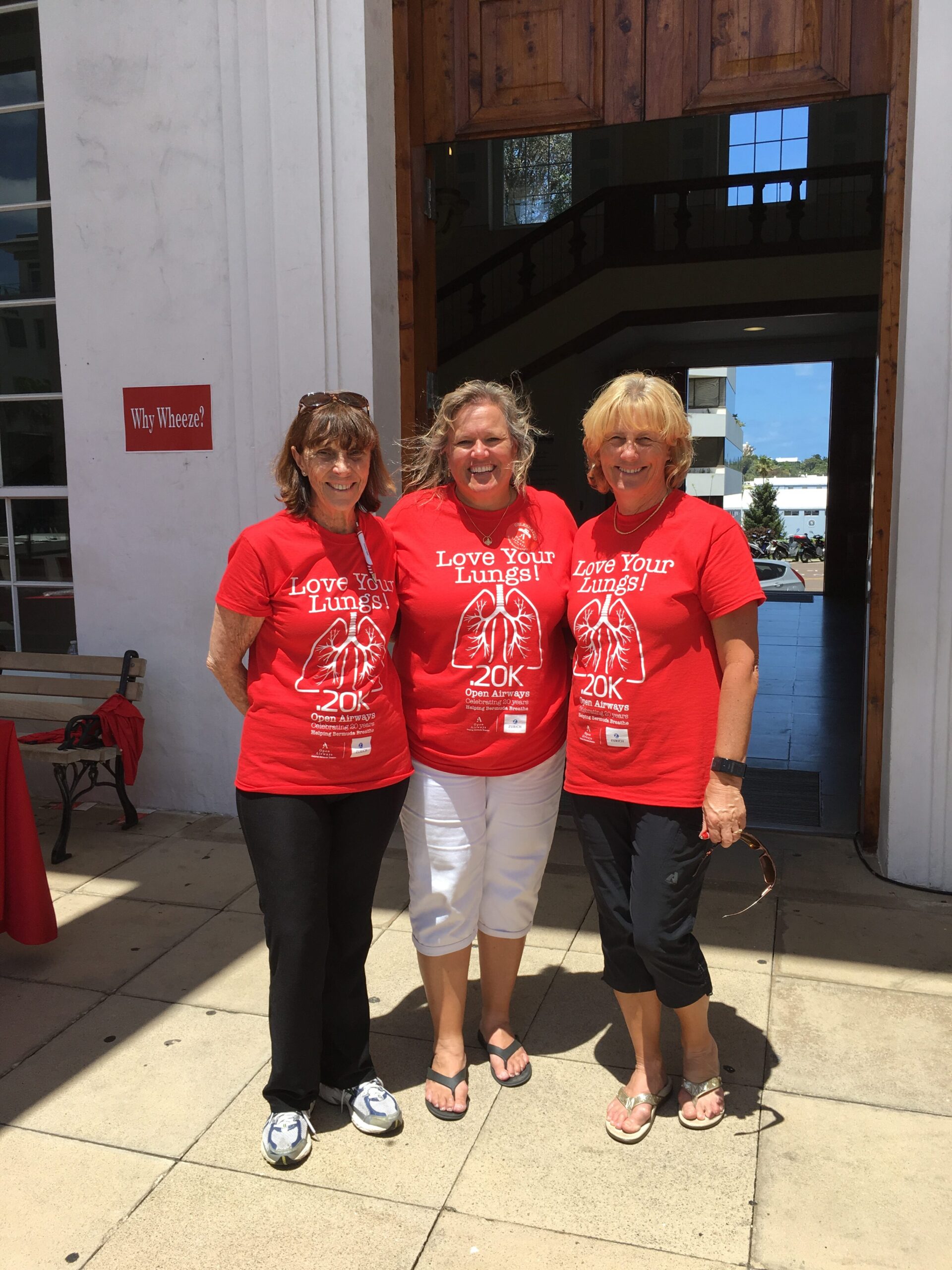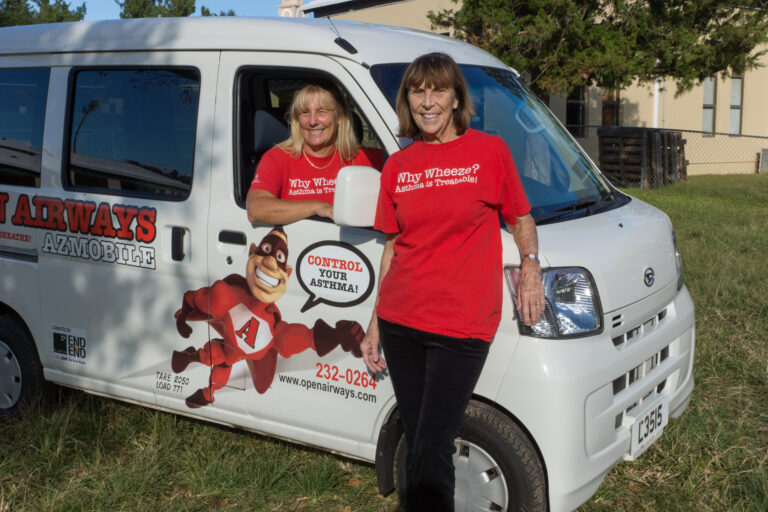OPEN AIRWAYS HAS BEEN HELPING BERMUDA BREATHE FOR 25 YEARS
by Annabel Cooper
Asthma is prolific throughout Bermuda and left untreated is a debilitating and life-threatening condition. The good news however is that it is 100 percent treatable. But what if you don’t know how? Or, what if you do, but can’t afford a preventative inhaler?
For 25 years Open Airways has been dedicated to educating Bermuda’s residents about asthma and how to live a healthy life with it, while also providing financial and physical support to sufferers and their families.
Asthma nurse, Liz Boden, a life-long asthma sufferer herself, founded the charity in 1997 because there was a great need for asthma support throughout Bermuda, and her husband, an accountant, told her she couldn’t afford to keep giving equipment away for free.
When the charity opened its bank account however, it was with a grand total of $6.75, donated by a young boy called Christopher Pullen. He had overheard Ms Boden saying that some of the children she helped didn’t even have proper beds and that was one reason why their asthma was so bad. He earned the money doing odd jobs at home.
Community and corporate support since then has improved their bank balance allowing them to do considerably more than just provide free medication and equipment.
In addition to Ms Boden, nurse Tracy Nash is director of asthma education, and Mary Ellen Ewles, is director of operations.
Open Airways may be a small organisation, but with an estimated one in five children and one in ten adults suffering from asthma in Bermuda, the impact they make is huge.
To save money, the charity doesn’t have physical offices. Instead, nurses Boden and Nash either work from home and offer video consultations, or go out into the community in their ‘Azmobile’, to fulfil a multitude of programmes, workshops and in-person consultations.
They go to schools to teach their Asthma Education Programme and also run ‘lunch and learn’ workshops, summer camp workshops, pre-school workshops and attend various health fairs where they offer asthma education and prevention, and follow-up consultations when necessary.
Their well-established ‘Pillows for Prevention’ programme provides every primary school child that has asthma with a new pillow each year. The aim is to establish a life-long habit of replacing your pillow annually.
Their Spacer Distribution Programme provides spacer devices to asthma sufferers of all ages who use inhalers, to ensure inhaled medication is getting into the airways properly. A spacer device is attached to the inhaler’s mouthpiece, making it easier to use.
Open Airways’ number one priority is to help everyone who suffers from sensitive airways, no matter their circumstances and in order to control asthma and prevent an attack, the mantra, said Ms Boden, is “take your preventer every day to keep your asthma away”.

Preventers and other asthma medications are expensive however, as is insurance, but their medication assistance programme helps anyone who is unemployed, uninsured or under-insured. It includes free consultations and then Open Airways pays for their prescribed medications.
“This was something we pivoted to when Covid struck,” explains Ms Nash. “We needed to make sure that people had their inhalers and we knew a lot of people couldn’t afford them and they were struggling and would try and get by without them.”
Instead of handing the inhalers out, they arrange for patients to pick up three months’ worth at a time from the pharmacy. “They still have to see their doctor and get their prescription and we step in at the pharmacy level,” she continued. “We have an account with the pharmacy so they could charge Open Airways.” Three months’ worth means patients must check in so the nurses can ensure they are taking their preventative inhaler every day.
“They’re all taking it because they can afford it now,” added Ms Boden. “Many people never had an idea that they could have controlled asthma.”
Occasionally, patients will try and give their inhalers back believing their asthma is cured before the nurses explain that their asthma is ‘better’ because they are taking their preventer every morning and night. There is no cure for asthma, yet.
Previously, people would simply have managed as best they could, which would ultimately result in a trip to the hospital emergency room. “We’ve got the admissions to the hospital down by 83 percent,” said Ms Boden.
As part of their service, the nurses might also visit patients’ homes and assess them for asthma triggers.
Triggers include allergens such as mould, mildew, dust mites, year-round high pollen count, cockroaches, grass and some pets. The cold virus is also a major trigger.
Other triggers include ‘indoor air pollution’ such as cigarette smoke, household cleaning products and plug in air fresheners or sprays. “People in Bermuda love their sprays,” said Ms Boden. “They come into a house, they think it smells, so what do they do? Febreeze. They irritate sensitive airways.
“We teach them that there’s ‘free breeze’ outside. Open the window! Ventilation is very important.”
To help in this respect, Open Airways gives away free microfibre cloths and teaches how to dust with just that, or a bit of water on the cloth. Where necessary, they may also arrange for new pillows and mattresses.
An important step is to help asthma sufferers develop their own personal action plan, including what inhalers to use, how to deal with their triggers and how to recognise if their asthma is getting worse.
“We have this traffic light system,” explained Ms Nash. “You have a green area of things to do when things are good. You have your orange area where you maybe increase your treatment because your asthma’s flaring up a bit and then you have the red area where you’ve got to go and seek emergency help.”
Because they are such a small team, Open Airways extends its reach by training healthcare professionals including nurses, doctors, physiotherapists and pharmacists, and because of this diploma programme has built up an island-wide network of asthma-trained experts.
When someone at one end of the island needs help but the nurses are at the other, they simply ring their closest contact to that emergency.
“By training healthcare professionals who work all over Bermuda, we know people are getting good care where ever they go,” Ms Boden explained, giving the example of a lady who’d called her earlier that morning.
“She was having an asthma flare up and had lost her spacer,” she said. “She lives in Somerset. I was able to call Caesar’s pharmacy. We have trained the superb owner, Cheryl Martins. We provide them with free spacers so Cheryl will be able to assess her, give her a spacer and then I told her she must go to the clinic.”
The Asthma Clinic at the hospital is run by another of Open Airways’ diploma graduates, Debbie Barboza.
The Open Airways team has helped thousands of people in their 25-year journey, but the need never goes away.
“Our biggest challenge is reaching people and teaching people,” said Ms Boden. “Asthma is very common, disrupting, disabling, potentially life threatening. It’s treatable. Medication is safe and effective. Everything we do is free. We’re passionate about making lasting change to people’s lives.
For more information about Open Airways, visit openairways. com or call 232-0264.

